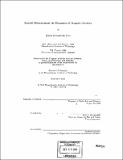Inertial measurement via dynamics of trapped particles
Author(s)
Post, E. Rehmi, 1966-
DownloadFull printable version (9.115Mb)
Other Contributors
Massachusetts Institute of Technology. Dept. of Architecture. Program in Media Arts and Sciences.
Advisor
Neil A. Gershenfeld.
Terms of use
Metadata
Show full item recordAbstract
We describe theoretical and practical aspects of the particle trap as an inertial sensor. The insight motivating this approach is that a trapped particle acts like a mass on a spring, but the restoring forces are provided by electrostatic fields. Exquisitely machined physical mechanisms can be replaced by carefully tuned mechanical physics. Such inertial sensors could be simpler to build yet exhibit superior performance because their operating parameters can be dynamically controlled. Most currently available inertial sensors are inherently planar devices that obtain no more than two degrees of motional sensitivity from a given proof mass. The availability of an accurate, inexpensive, integrated six-degree-of-freedom inertial sensor would enable new applications of inertial sensing that are presently either infeasible or unconsidered. By adding inertial terms to the Paul trap dynamics we derive classical observables that depend on the local acceleration field. We also confirm that these observables appear in practice, in what we believe to be the first electrodynamic particle trap accelerometer. An important (and unusual) aspect of our accelerometer is its dynamic tunability: its effective spring constant depends on the trap drive parameters. Our roughly constructed trap also exhibits a large region of linear response to acceleration, and we present evidence suggesting that our accelerometer has performance comparable to commercially available sensors.
Description
Thesis (Ph. D.)--Massachusetts Institute of Technology, School of Architecture and Planning, Program in Media Arts and Sciences, 2003. Includes bibliographical references (leaves 69-70).
Date issued
2003Department
Program in Media Arts and Sciences (Massachusetts Institute of Technology)Publisher
Massachusetts Institute of Technology
Keywords
Architecture. Program in Media Arts and Sciences.